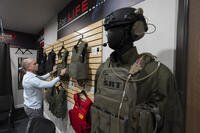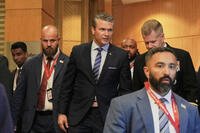Venezuelan strongman Nicolás Maduro announced a sweeping military mobilization he is calling Plan Independencia 200 in response to the large concentration of U.S. naval forces near the country’s shores ordered by President Donald Trump to combat drug cartels.
Speaking Thursday night on state-run television, Maduro said he had ordered the activation of 284 “fronts of battle” across the country, vowing that the forces would keep Venezuela’s coastline free of “imperialists, invaders and violent groups.”
The announcement came amid growing tensions with Washington, which has deployed one of its largest naval operations in the Caribbean in decades under the banner of combating drug trafficking.
At Ciudad Caribia, a massive housing complex outside Caracas, Maduro framed the initiative as a nationwide defensive posture. “We must have our coasts from end to end free of imperialists, invaders and violent groups,” he declared, standing alongside Defense Minister Vladimir Padrino López. “The seas, lands, and mountains belong to the people of Venezuela; they will never belong to the American empire.... We have increased our capacity to mobilize at any time, for any purpose, and for any purpose.”
Maduro’s rhetoric was accompanied by the deployment of armed units in coastal states such as Falcón, the oil-rich Catatumbo region in Zulia, the Andes, and the plains of Apure. He emphasized what he described as a “popular-military-police union,” saying its goals are “integral defense, active resistance and permanent offensive.”
He added defiantly: “Venezuela will never humiliate itself or kneel before foreign powers. Never will we be on our knees.”
Earlier this week, Padrino López reported from a military bunker that 25,000 troops had been deployed in the western states of Táchira and Zulia, which border Colombia. While the mobilization was officially presented as part of Caracas’ own anti-narcotics efforts, many inside Venezuela interpreted the size of the deployment as an attempt by the regime to flex its military muscle amid escalating tensions with the U.S.
‘Prepared for Any Prolonged War’
The regime’s number two, Diosdado Cabello, doubled down on the threats during his weekly program on state television Con el Mazo Dando (Hitting with the Club).
Venezuelans “are prepared for anything, for any prolonged war,” Cabello said. “And when it comes to defending the homeland, everything is allowed — except not to defend it.”
Cabello, who also serves as interior minister and secretary general of the ruling Socialist Party, dismissed U.S. claims that its Caribbean deployment is about drugs. “The aggressions against Venezuela are not about narcotics,” he said. “Venezuela does not produce cocaine, it does not grow marijuana. Trafficking is minimal. But Venezuela does have oil, gas, gold, coltan — and it has dignity.”
The U.S. has indicted Maduro, Cabello and Padrino López on drug conspiracy charges and placed a $50 million bounty on Maduro’s capture, accusing the three of running the so-called Cartel of the Suns. Maduro has dismissed the allegations as being part of a U.S. regime-change strategy and vowed to mobilize the military and the country’s militias to defend Venezuela’s sovereignty.
Cabello, who runs most of the country’s security apparatus, also claimed that even some opposition sectors had “joined the initiative” of defending the nation, though he offered no details about which of Maduro’s rivals might support the mobilization.
Washington: ‘We Will Not Tolerate Narco-Terrorists’
In Washington, the White House reiterated its stance that Maduro’s government is “illegitimate” and accused it of being directly involved in the drug trade. Spokeswoman Karoline Leavitt referenced a recent U.S. operation against a Venezuelan boat carrying narcotics in the Caribbean, where 11 alleged members of the Tren de Aragua criminal network were killed.
“This sends a clear message to narcotraffickers around the world: the president will not tolerate it,” Leavitt said, claiming that the drugs on board could have killed “thousands of Americans.”
The Pentagon has confirmed that the operation under way in the southern Caribbean includes more than eight warships, a dozen aircraft, and roughly 5,000 personnel — one of the largest U.S. naval mobilizations in the region since the 1980s. The guided-missile destroyer USS Sampson recently returned to Panama as part of joint security cooperation, though it did not transit the canal.
U.S. Defense Secretary Pete Hegseth told Fox News that Maduro has “decisions to make.” He warned: “We are prepared to use our power to destroy the narco-terrorists sending drugs to the United States.”
Hegseth’s visit to American troops stationed in Puerto Rico underscored the seriousness of the deployment. “You are on the front line,” he told service members. “This is not a training exercise. This is a real operation.”
© 2025 Miami Herald.
Visit miamiherald.com.
Distributed by Tribune Content Agency, LLC.













